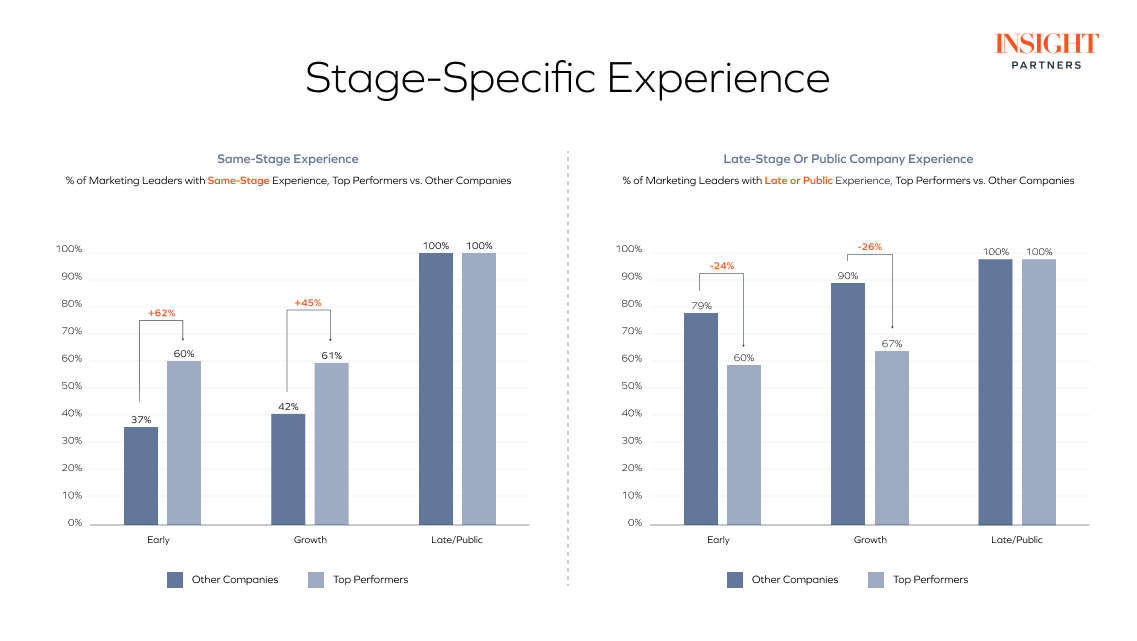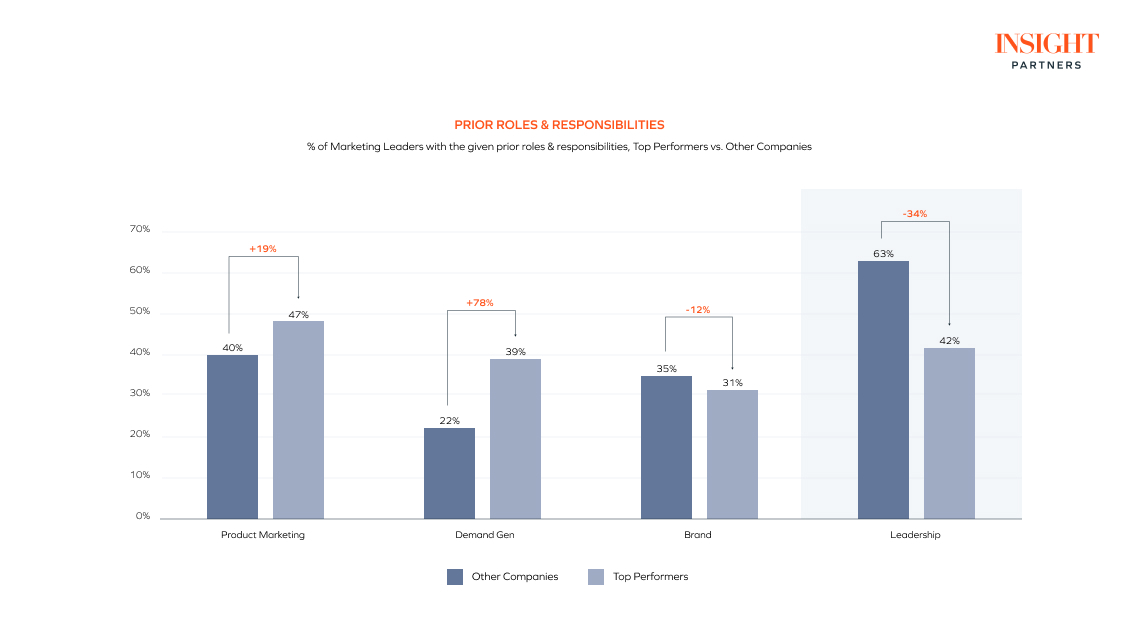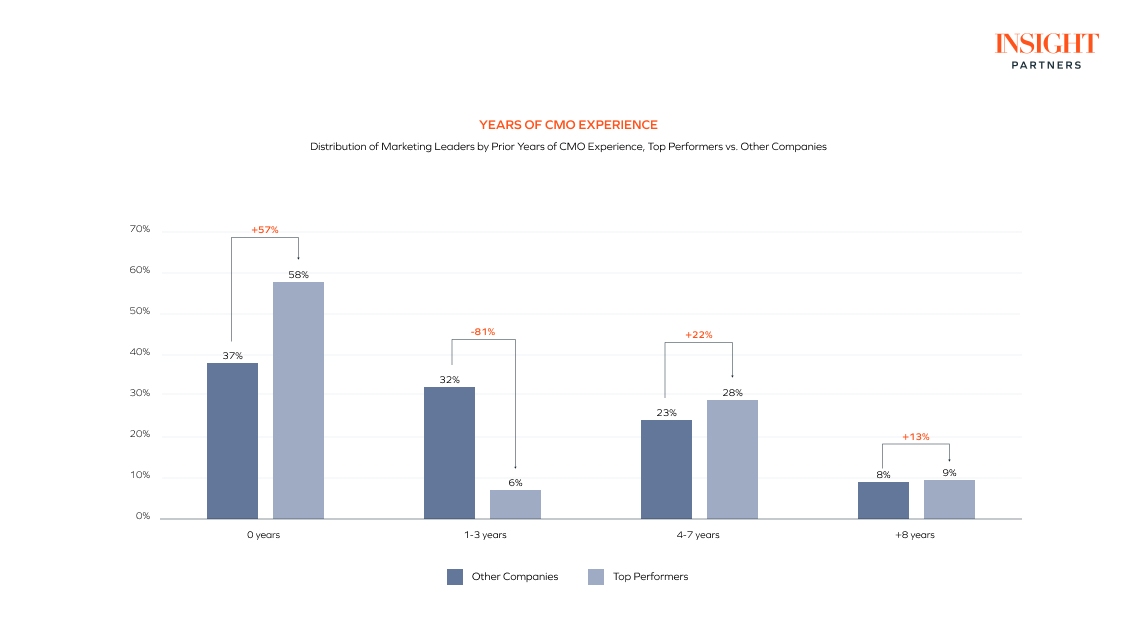Successfully navigating the startup to ScaleUp journey requires many refinements, evolutions, and straight-out changes to strategy and execution. To do this successfully, founders and CEOs need the right leaders. The right leader can marshal their team to quickly seize new opportunities and outmaneuver competitors. The wrong leader can move too slowly or in the wrong direction, causing wasted cycles and company-destroying burn. This is why at Insight Partners we spend thousands of hours each year helping our founders and CEOs find, assess, and secure the right leaders.
Hiring for marketing leadership, in particular, is a high-stakes challenge. When marketing isn’t working, companies struggle with who to target, what to say, and how to engage, leading to stunted growth, inflated CAC, and accelerated burn. This ultimately limits fundraising and exit opportunities. That said, choosing the right marketing leader is not easy given the range of skillsets and backgrounds to choose from.
Based on our experience, the ideal marketing leader is some combination of a/an:
- Inquisitive product marketer who understands markets and buyers and is adept at crafting messaging that resonates with specific audiences.
- Data-driven demand generator who can test and learn to systematically leverage the right mix of marketing channels to drive efficient and effective growth.
- Creative storyteller and brand builder who can craft and amplify a compelling narrative that breaks through the market noise.
- Impactful leader who can collaborate with and influence company leadership to shape strategy while also building and leading an efficient, high-performing, diverse team to tackle key challenges and deliver results.
However, finding someone who excels at all of the above is incredibly challenging. This often means making trade-offs by prioritizing the qualities and competencies needed to solve near-term challenges. Across our Marketing and Talent Centers of Excellence (COE), we have hundreds of conversations with founders and CEOs each year to help them navigate these trade-offs.
In these conversations, the most common question we get asked is: ”Who are your top-performing companies hiring?” While we speak to this from our experience having worked with marketing leaders across our portfolio, we decided it was time to validate this with data. We examined the backgrounds of marketing leaders at our B2B SaaS portfolio companies, noting data points including what stage companies they’ve worked at previously and their role and responsibilities. We then compared our top-performing companies (“Top Performers”) to the other companies (“Other Companies”) in our portfolio. These Top Performers are companies that are above average in growth, net revenue retention, and efficiency.
Below are our top three key takeaways.
1. Hire for stage-specific experience
Top Performers hired marketing leaders with prior experience at their specific stage of growth.
Insights from the data
The majority of marketing leaders at Top Performers have prior experience at the relevant stage of growth. Contrast this to our Other Companies, which tended to hire leaders with experience at companies in a later stage of growth. Compared to Other Companies, Top Performers are more likely to hire leaders with same-stage experience and less likely to hire leaders with experience beyond their stage.

Right: The Late or Public Experience Chart shows for companies in specific stages of growth, what percent of their marketing leaders had prior experience with late-stage or publicly traded companies. For example, at growth-stage Top Performers, only 67% of marketing leaders had experience at a late-stage or publicly traded company, while this figure was 90% for Other Companies.
Insights from Insight
Companies face unique challenges depending on where they are in their scaling journey. Early-stage companies need to deepen product-market fit and get to repeatable traction, with marketing focused on understanding the market and buyers to determine who to target, what to say, and how to engage. Importantly, they need to do this with limited people and budget. Contrast this to later-stage companies that need to drive predictable and efficient growth, with marketing focused on optimizing the demand generation engine and building brand awareness across multiple products and geographies. With this in mind, we advise companies to prioritize hiring leaders with prior experience in their growth stage.
A common pitfall we warn against, especially at early-stage companies, is looking for someone who “has it all” — often the result of more experience and seniority — or is coming from a big name, later-stage company. Why doesn’t this work? These leaders often don’t know how to navigate the stage-specific challenges and lack the scrappy, roll-up-sleeves mentality needed in the early-stage.
2. Hire for must-have competencies
Top Performers hire marketing leaders with the specific competencies needed to meet near-term challenges and goals.
Insights from the data
Product marketing was the most common background among Top Performers’ marketing leaders. Demand generation experience was also well represented among Top Performers’ marketing leaders, though surprisingly low in Other Companies, which leaned more heavily into prior leadership experience, meaning someone who owned the full marketing function (e.g., Head of Marketing or CMO).
When compared to Other Companies, Top Performers are:
- 78% more likely to hire leaders with demand gen backgrounds.
- 19% more likely to hire leaders with product marketing backgrounds.
- 12% less likely to hire leaders with brand marketing backgrounds.
- 34% less likely to hire leaders with prior marketing leadership backgrounds.
Overall, marketing leaders at Top Performers spiked in specific marketing competencies versus Other Companies, which had a bias toward prior leadership experience.

Insights from Insight
For startups and ScaleUps, especially in the current environment, having a deep understanding of their market and buyers is foundational for efficient growth. It helps ensure that they have the right message for the right buyer at the right time (more on this in our SaaS marketing benchmarks and strategy trends for 2024). This makes the core product marketing skillset invaluable and what we advise many of our companies to prioritize, especially when there needs to be further deepening of product-market fit or when there is a more complex, enterprise sales buying process.
That said, marketing leaders must have a strong understanding of demand generation. We advise prioritizing demand generation capabilities over product marketing if your company targets a large market of individual users or businesses (e.g., small and mid-market buyers), or if you have achieved repeatable traction and are ready to rapidly scale. It’s not surprising that Top Performers are more likely to prioritize demand generation than Other Companies. Top Performers have achieved strong product-market fit, recognized it, and hired marketing leaders with the most relevant background to accelerate pipeline and growth.
Lastly, prior leadership experience is not a guarantee of future leadership success. We’ve seen marketing leaders who were successful at one company fail at another if there is a stage or capability mismatch. Growth- and later-stage companies with more complex businesses and larger marketing teams will benefit most from screening for prior leadership experience, while making sure to still prioritize the core competencies needed given where they are in their scaling journey.
3. Don’t overly restrict the talent pipeline
Top Performers are open-minded about what can and cannot be learned by the right candidate and are more willing to take a chance on up-and-comers.
Insights from the data
Top Performers are more likely than Other Companies to make first-time CMOs, with 58% of those with CMO titles having no prior CMO experience (versus 37% at Other Companies). The Top Performers that do hire for prior CMO experience will look for more battle-tested candidates, with most of these experienced hires having 4+ years of prior CMO experience.

Insights from Insight
In any hiring process, it’s critical to see a diverse slate of candidates that represents the priority competencies and skills you are seeking — and enough of them to find that best-fit candidate. We often see issues arise when founders and CEOs overly restrict the talent pool. One way this happens is by requiring someone to have previously held a CMO position.
While there are occasions where this is a must, Top Performers will often take a chance on that hungry up-and-comer with the right attitude and a demonstrated track record of success. Another way the talent pool gets restricted is by requiring prior experience selling in or to a specific vertical or persona. While this can be a plus and reduce ramp time, we always press on when this prior experience is required versus a nice-to-have. That said, for certain verticals (e.g., healthcare) where the market is very complex or if it’s a very specific persona, it can make sense to prioritize this background.
Hiring best practices
On the journey from startup to ScaleUp, the right team can mean the difference between success and failure. When it comes to hiring your marketing leader, three best practices for getting this right based on the data and our experiences are:
- Hire for stage-specific experience: Look for candidates who have experience navigating the challenges of your specific stage of growth. For example, early-stage companies should look for someone who has worked at an early-stage company before and is hands-on, scrappy, and knows how to test and refine product-market fit and go-to-market strategy.
- Hire for must-have competencies: It will be challenging to find a candidate who has it all. Fortunately, you don’t have to. Instead, be clear on the prioritized, must-have competencies and skills, and document this in a scorecard to drive alignment in the hiring process. Take our advice — don’t hire someone too senior in an attempt to have it all.
- Don’t overly restrict the talent pipeline: Founders and CEOs are busy. Using a scorecard and other screening mechanisms to filter candidates is critical to ensuring that time is well spent. That said, there’s also a need to see enough candidates. Don’t overly limit the talent pool with criteria that are more nice-to-have than must-have. We recommend working with a specialized recruiter who knows the talent pool and can quickly increase the pipeline of high-quality talent.
Other best practices to consider when hiring your marketing leader include using a take-home case study (nothing too onerous, though), leveraging a stage-appropriate marketing expert to help conduct a functional interview, and conducting 360-degree referencing.
If you are an Insight portfolio company, contact hire@insightpartners.com to learn more about how we can support you with the above best practices, including creating scorecards, finding and assessing candidates, conducting reference checks, and structuring the right offer.








